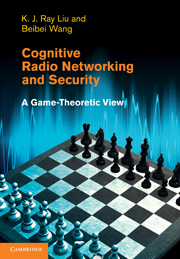Book contents
- Frontmatter
- Contents
- Preface
- Part I Cognitive radio communications and cooperation
- 1 Introduction to cognitive radios
- 2 Game theory for cognitive radio networks
- 3 Markov models for dynamic spectrum allocation
- 4 Repeated open spectrum sharing games
- 5 Pricing games for dynamic spectrum allocation
- 6 A multi-winner cognitive spectrum auction game
- 7 Evolutionary cooperative spectrum sensing games
- 8 Anti-jamming stochastic games
- 9 Opportunistic multiple access for cognitive networks
- Part II Resource awareness and learning
- Part III Securing mechanism and strategies
- References
- Index
5 - Pricing games for dynamic spectrum allocation
from Part I - Cognitive radio communications and cooperation
Published online by Cambridge University Press: 06 December 2010
- Frontmatter
- Contents
- Preface
- Part I Cognitive radio communications and cooperation
- 1 Introduction to cognitive radios
- 2 Game theory for cognitive radio networks
- 3 Markov models for dynamic spectrum allocation
- 4 Repeated open spectrum sharing games
- 5 Pricing games for dynamic spectrum allocation
- 6 A multi-winner cognitive spectrum auction game
- 7 Evolutionary cooperative spectrum sensing games
- 8 Anti-jamming stochastic games
- 9 Opportunistic multiple access for cognitive networks
- Part II Resource awareness and learning
- Part III Securing mechanism and strategies
- References
- Index
Summary
In a cognitive radio network, collusion among selfish users may have seriously deleterious effects on the efficiency of dynamic spectrum sharing. The network users' behaviors and dynamics need to be taken into consideration for efficient and robust spectrum allocation. In this chapter, we model spectrum allocation in wireless networks with multiple selfish legacy spectrum holders and unlicensed users as multi-stage dynamic games. In order to combat user collusion, we present a pricing-based collusion-resistant approach for dynamic spectrum allocation to optimize overall spectrum efficiency, while not only keeping the incentives to participate of the selfish users but also combating possible user collusion. The simulation results show that the scheme achieves a high efficiency of spectrum usage even with severe user collusion.
Introduction
Traditional network-wide spectrum assignment is carried out by a central server, namely a spectrum broker. Distributed spectrum allocation approaches that enable efficient spectrum sharing solely on the basis of local observations have recently been studied. From the economic point of view, the deregulation of spectrum use further encourages market mechanisms for implementing efficient spectrum allocation.
Because of the spectrum dynamics and lack of centralized authority, the spectrum allocation needs to distributively adapt to the dynamics of wireless networks due to node mobility, channel variations or varying wireless traffic on the basis of local observed information. From the game-theoretic point of view, first of all, the spectrum allocation needs to be studied in a multi-stage dynamic game framework instead of the static game approach.
- Type
- Chapter
- Information
- Cognitive Radio Networking and SecurityA Game-Theoretic View, pp. 133 - 154Publisher: Cambridge University PressPrint publication year: 2010



